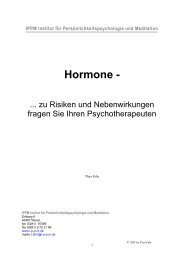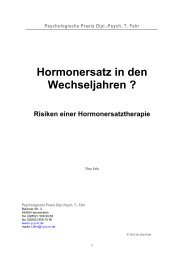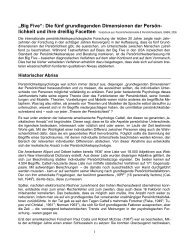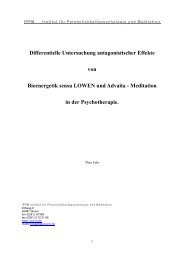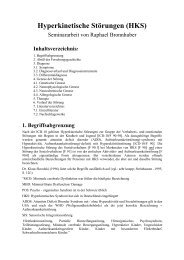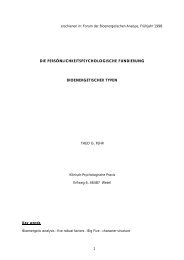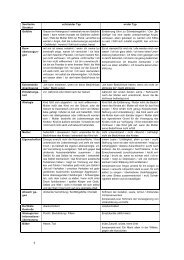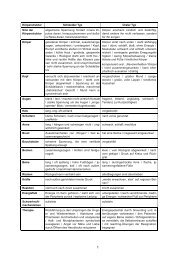Die Wirkung von Antidepressiva - IPPM
Die Wirkung von Antidepressiva - IPPM
Die Wirkung von Antidepressiva - IPPM
Sie wollen auch ein ePaper? Erhöhen Sie die Reichweite Ihrer Titel.
YUMPU macht aus Druck-PDFs automatisch weboptimierte ePaper, die Google liebt.
Methodological biases<br />
Although the research studies of antidepressants are inconsistent, and overall the differences<br />
found between antidepressants and placebo are small, especially in recent studies, there are<br />
many studies that suggest that antidepressants are somewhat better than placebo. However<br />
there are several factors about the way these studies are conducted and reported that may artificially<br />
inflate the apparent benefits of antidepressants.<br />
1. Publication bias<br />
We know that positive studies are more likely to be published than negative ones. A recent<br />
Swedish study confirmed that some negative studies of antidepressants are not published. 5 If<br />
negative studies are not published, meta-analyses that pool the results of published studies<br />
will overestimate the effects of antidepressants. This seems to be borne out by the fact that the<br />
meta-analysis by Kirsch et al, 4 which included unpublished studies, found smaller differences<br />
between antidepressants and placebos than previous meta-analyses.<br />
2 Amplified placebo effects<br />
To work out whether antidepressants are really better than placebos, studies need to be done<br />
double-blind: neither the participants nor the researchers should know who is taking antidepressants<br />
and who is taking placebo tablets. But many studies have shown that often both parties<br />
can guess what participants are taking. This should come as no surprise: people involved<br />
in clinical trials will of course be curious to know whether they are in the active or placebo<br />
group. They may notice that placebo tablets taste different to medication they have previously<br />
taken. Active medication, such as antidepressants, may produce side effects that distinguish it<br />
from inert placebo tablets. People in the antidepressant group may then experience a so-called<br />
amplified placebo effect (the effect whereby people experience changes in mood/condition<br />
because they expect to do so), simply because they know or suspect they are taking the active<br />
medication as opposed to the dummy tablet. The same expectancy may affect the scoring by<br />
the raters in research studies.<br />
Some older studies compared antidepressants with 'active' placebos - that is placebos containing<br />
an active substance that is not an antidepressant but has some of the same side effects - to<br />
minimise this problem. These studies found small and mostly negligible differences between<br />
the antidepressant and the placebo. 6 However, even in these studies participants could often<br />
distinguish between antidepressants and the active placebos, possibly because the antidepressants<br />
had more profound side effects.<br />
3. Measurement<br />
Since depression is a subjective state that probably means different things to different people,<br />
measuring it is complex. Most studies of depression and antidepressants now use questionnaires<br />
tha): include various combinations of symptoms of depressive states. All these questionnaires<br />
contain items that concern symptoms such as sleep, anxiety and agitation that<br />
would respond to any drug with sedative effects. Changes on these items may therefore not<br />
necessarily indicate a specific effect of the drug on depression or mood.<br />
4. Analysis and presentation of results<br />
Data can be analysed and presented in a way that exaggerates the effects of a treatment. For<br />
example, it is common to use multiple rating scales and measures, and then only to report or<br />
26




